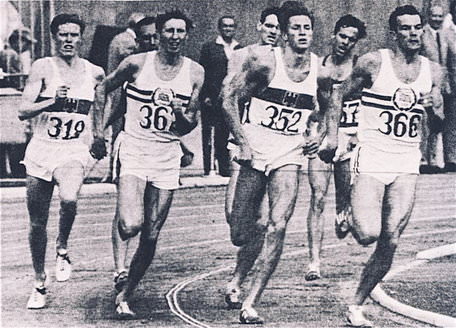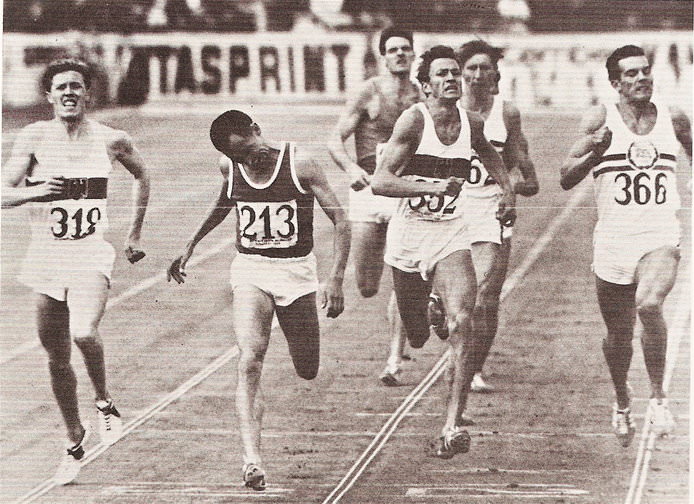Articles / Great Races
Kemper v Boulter v Tummler v Carter v Matuschewski: Great Races #25
By John Cobley
21st July 2014
Kemper v Boulter v Tümmler v Carter v Matuschewski
Great Races #25
European 800 September 4, 1966 Budapest
 |
| Entering the final straight: Carter, Esteban, Tümmler, Carroll,Boulter, Matuschewski, Kemper (left to right). |
In the mid-1960s, the retirement of Peter Snell left a void in the 800. He had dominated the event for four years--from his Olympic win in 1960 to a repeat win in 1964. However that void was soon filled. In 1965 there were only five runners under 1:47; in 1966 there were eighteen. One race that exemplified this change was the Euro 800 in 1966, where the sixth runner ran 1:47.0.
The 1966 European final for the 800 was loaded with talent. Foremost was West German Franz-Josef Kemper (20), who had just broken the European record with 1:44.9, only 0.6 off Peter Snell’s WR. Many considered him the odds-on favorite—the fastest man and the man in form. His team-mate Bodo Tummler (23), though not so fast over 800, could not be discounted after his impressive win in the Euro 1,500 a few days before. In this 1,500 race Tummler had soundly defeated the great Michel Jazy with an impressive 52.7 for the last 400—almost the exact speed of Kemper’s 1:45.9 European 800 record. Additionally Tummler had already show great tactical ability.
Matching this West-German duo was a lone East German, Manfred Matuschewski (27), who in fact was the reigning European 800 champion, having easily won a slow tactical race in 1962 with a fast finish. At 27, he was the most experienced in the field, having also finished sixth in the 1960 Olympic 800. However there were two question marks against the East German: he had failed to make the 1964 Olympic final, and there were doubts about his current fitness.
Also in this final were two very talented English runners who had been winning many 800s in international matches: John Boulter and Chris Carter. John Boulter (25), two years older than Carter, had been running consistently in the 1:47s for three years and had recently run a fast 1:46.5. Carter (23) had run a British record of 1:46.6 in 1965 and was looking to continue his consistent annual improvement. Despite their fast times, the English duo lacked the proven finishing speed of the three Germans; they would have to find a tactic to exploit their strength and avoid a fast finish.
Of the other three finalists, only Irishman Noel Carroll looked a possible medalist. He had run a fast 1:46.7 to win an 800 race in Dublin and had a lot of competitive experience from his years in the USA. Rounding out the field were the promising Tomas Jungwirth, who had looked good in his semi in finishing second behind Kemper, and Spain’s Alberto Esteban.
Tactics
Thus there were two serious rivalries in this field. The most obvious was the one between the two English runners and the three Germans. But the strongest rivalry was between the two West Germans and the East German, where political Cold-War issues prevailed.
As for tactics, the situation required something more positive than what transpired in the previous Euro 800 final when the field coasted for 700 and then, with all the finalists in a bunch, sprinted the last 100. Clearly, Matuschewski and Kemper would be happy with a slow race, since both had confidence in their kicks. Tummler, who had 1,500 strength, seemed a possible pacemaker, but this race was to be his fifth in six days and he surely had some residual fatigue. Carroll, suffering from a stomach ailment, was unlikely to be a contender.
It was Chris Carter who decided do something radical: “I looked at the field for final and saw a lot of fast finishers: Matuschewski, Kemper, and Carroll (I’d never beaten him), and I had to be in front of Boulter before the straight as I might have trouble passing him.”
Carter’s plan was to lead from the start. “I decided I might as well go out in a blaze of glory and run it from the front.” He had no discussion with British team coach Tom McNab. “It was my decision to go out from the front from the outside lane.”
The Race
His plan started well. Drawn in lane 8, he ran a strong first bend, and as soon as they broke lanes he ran in a direct line to the inside lane at the start of the second bend. His plan was successful and put him in the lead at the 200 mark (25.4). He was feeling in control at the bell (51.7): “I had run 47.7 for 400, so I was well inside my comfort zone. I just had to keep plugging away as well as I could.”
While Kemper had run last for the first half of the race, Tümmler was dominant behind Carter, leaving the rest of the field to jockey for positions. At 600 (1:19.3) Carter was still leading. The field seemed quite happy with Carter’s pace. “I can’t help feeling [the 600 time] might have been a little faster than that,” Carter recalls. “I was quite surprised that no one was challenging me; I couldn’t feeling anybody immediately on my shoulder. But I knew that hitting the straight was going to be a problem.”
Indeed. As Carter completed the final bend, runners were lining up behind him across the track. The lead was to change three times before the tape. Carter was still on the inside, then Tummler, then Boulter, and on the outside and almost in lane three was Kemper. The West German, who at 20 was new to international competition, had run much of the second lap in lane 2 or wider as he had to move up the field from last place. Behind these four was Jungwirth in lane 1 and Matuschewski in lane 2.
 |
| The desperate finish. Winner Matuschewski (213) has found the gap between Kemper (319) and Tümmler (352). Carter (366) just fails to catch Tümmler at the tape. |
A wily competitor after many international competitions, Carter kept close to the kerb as he thought someone might try to come through on the inside. Tummler, perfectly placed on Carter’s shoulder, was the first to challenge for the lead. He moved past Carter and briefly held the lead. Then Kemper charged past and looked to have the race sewn up. However, Matuschewski saw a gap opening up as Boulter faded and the inexperienced Kemper moved out to almost the fourth lane. The East German dug down and found he still had the kick that had served him so well four years earlier.
At the tape, Matuschewski had just 0.1 margin over Kemper. Tummler just held on for the bronze as Carter fought back in the last 50m and finished in the same time. The plucky Brit was rewarded with another British record, but he would surely have preferred a medal. “I didn’t know whether [Tümmler] had beaten me we were so close,” Carter remembers. “Hearing my time somewhat alleviated the disappointment as it was a British record.”
Post-Race
Matuschewski was fortunate to find a last-minute gap to burst through, but there’s no doubt that it needed a brilliant athlete to take advantage of it. While his wait-and-see tactics might seem risky to some, Marcel Hansenne, a great runner himself in the 1940s, saw the East German’s win as “a perfect race, one that should be shown to all 800 specialists as a model of tactics and technique.” (Miroir de l’athlétisme, 1969. My translation.) High praise indeed for the “Millimeter Runner,” as he was known for his narrow victories.
This wonderful race produced a meet record, four national records and five PBs. Of the first five finishers, only Kemper didn’t run a PB. Because of his poor positioning, he must have run much farther than any of his competitors. Had he not given himself so much to do in lap 2, he would surely have been able to hold the lead to the tape. Tümmler, despite fatigue from four earlier races, confirmed his 800 speed and came very close to achieving the classic 800/1,500 double. Jungwirth and Esteban also ran national records, while an unwell Carroll ran a brave 1:47.9, only two seconds behind the winner.
It’s fair to say that a lot of these great times would not have been achieved without Carter’s brave effort at the front. But the British Team Coach, who hadn’t ever coached a middle-distance athlete, didn’t appreciate Carter’s effort. “Well you fucked that one up, didn’t you!” was his post-race comment to the exhausted runner. This comment clearly still rankles Carter after 48 years: “As if I could have won it coming from behind! I knew that although I was pretty quick over the last 150, against the world’s best I wasn’t going to be the fastest.”
1. Manfed Matuschewski EG 1:45.9; 2. Franz-Josef Kemper WG 1:46.0; 3. Bodo Tummler WG 1:46.3; 4. Chris Carter GBR 1:46.3; 5. Tomas Jungwirth CZE 1:46.7; 6. John Boulter GBR 1:47.0; 7. Alberto Esteban SPA 1:47.4; 8. Noel Carroll EIR 1:47.9.
(All Chris Carter’s comments were from a telephone conversation on July 11, 2014.)
1 Comment